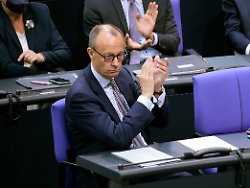Bundestag calls for heavy weapons
Traffic light and Union agree – somehow
By Sebastian Huld
4/28/2022 12:06 p.m
With a large majority, the governing parties as well as the CDU and CSU are calling for Ukraine to also be supported with the delivery of heavy weapons. But the common signal that the decision is supposed to send is getting lost in party political bickering.
With the votes of the three governing parties and those of the largest opposition faction, the Bundestag spoke out in favor of supporting Ukraine with further arms deliveries, including so-called heavy weapons. Britta Haßelmann, leader of the Greens parliamentary group, is pleased that this is a signal that democrats in the Bundestag are standing together when it comes to Ukraine policy. In the debate before the vote, she thanks her “dear colleagues from the Union”. But if the factions of the SPD, Greens and FDP actually hoped for something like unity with the Union in Ukraine politics, Friedrich Merz clears it up right away.
When the opposition leader took the podium as the second speaker after Haßelmann, he read the riot act to Olaf Scholz instead of praising the joint decision. He accuses the chancellor of “hesitation,” “hesitation” and “timidity” in supporting Ukraine, which was invaded by Russia. Merz reminds that the joint decision was preceded by a corresponding application from the Union and only then followed the paper of the traffic light groups, which ultimately became the basis of the joint decision. “If we hadn’t submitted an application last week, you would never have thought of it,” Merz exclaims. With a view to yesterday’s debate about the 100 billion euro special fund for equipping and upgrading the Bundeswehr, Merz is again calling for the independent defense budget to continue to increase over the long term so that the Union supports the amendment to the Basic Law required for the special fund.
Bladebeel is outraged
The signal of cohesion praised by Haßelmann is therefore missing. The SPD chairman Lars Klingbeil, who follows CDU boss Merz, is indignant about this. “There is no room for party-political profiling here,” Klingbeil warns the Union, reminding them that the SPD also supported important decisions on Afghanistan and the euro crisis during its years as an opposition to the black-yellow government, based on the principle “First the country , then the party”. The mood between the government factions and the CDU/CSU is frosty again – as in the debates on the special fund and compulsory vaccination.
CSU politician Thomas Erndl takes the same line as Merz: “But it is also true that without the Union there would have been neither the application nor the debate today.” The Union is also upset that Chancellor Scholz is missing this important debate because he has left for the inaugural visit to Japan. “The federal chancellor should have given the state political speech here today,” replies Union faction leader Johann Wadepuhl to SPD leader Klingbeil, who accused Merz of a “party political speech”. Scholz followed the debate on Wednesday, but did not comment himself.
Open questions in the government course
In fact, it is unclear whether this joint decision would have been made without the Union initiative. Up to and including Monday, the German government had hesitated to provide the Ukrainian armed forces with heavy Western-style equipment. The SPD party and faction leadership in particular had vehemently defended this reluctance. In addition to the question of how quickly the Ukrainians could make meaningful use of Western weapon systems, Scholz and his SPD unanimously referred to the danger that Germany could become a party to the war by supplying its own material and a third world war could unintentionally be unleashed between NATO countries and Russia.
But not only the Union, but also traffic light politicians like the Green Anton Hofreiter and the chair of the defense committee, FDP politician Marie-Agnes Strack-Zimmermann, have been firmly contradicting this argument for weeks. The fact that the federal government made a surprising change of course on Tuesday by agreeing to the delivery of “Gepard” anti-aircraft tanks is explained by coordination processes with NATO partners that have been going on behind the scenes for a long time. That may be the case, but it doesn’t explain why the chancellor himself was citing the danger of nuclear war just a few days ago. Because to what extent this risk is no longer given by the delivery of German tank weapons – strictly speaking, the “Gepard” is not a tank – no government representative has explained so far.
Left and AfD want negotiations
The fact that there were 586 votes in the roll-call vote than the traffic light mandates (416) suggests that the Union has broad support. After publication of the roll-call vote, all parliamentary groups will read carefully which camp the few deviating votes come from.
Yes votes from the Left Party and AfD factions are unlikely to be found in the list. Speakers from both groups harshly criticized the decision. They called for diplomatic efforts instead of military build-up. Both parties left it open what exactly these might look like in the face of a Russian regime that repeatedly lied to Western representatives in the weeks before the attack on Ukraine and showed no serious interest in de-escalation.
